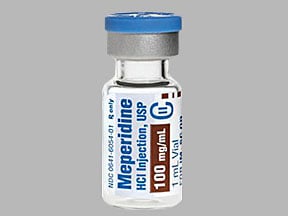
Demerol Coupons & Savings Card – Discount Prices from $2.00
Brand for: Meperidine
My prescription
Edit
1ML of 100MG/ML, Meperidine (1 Vial)
Select pharmacy

CVS
$22.11
COUPON PRICE
Walgreens
$2.00
COUPON PRICE
Albertsons
$3.02
COUPON PRICE
Walmart
$10.51
COUPON PRICEDemerol savings card
Show this card to your pharmacist
Walgreens
$2.00
BIN
ID
PCN
GRP
019876
LH9EBDAD96
CHIPPO
LHX
Powered by
Related opioids prescriptions
More prescriptions for pain
Related opioids prescriptions
More prescriptions for pain
Demerol (Meperidine) dosage forms
Dosage Quantity Price from Per unit 1ML of 100MG/ML 1 Vial $2.00 $2.00 1ML of 25MG/ML 1 Vial $8.05 $8.05 1ML of 25MG/ML 2 Vials $8.60 $4.30 1ML of 25MG/ML 3 Vials $9.14 $3.05 1ML of 50MG/ML 1 Vial $8.07 $8.07 1ML of 50MG/ML 2 Vials $8.64 $4.32 1ML of 50MG/ML 3 Vials $9.21 $3.07 1ML of 100MG/ML 2 Vials $2.00 $1.00 1ML of 100MG/ML 3 Vials $2.00 $0.67
| Dosage | Quantity | Price from | Per unit |
|---|---|---|---|
| 1ML of 100MG/ML | 1 Vial | $2.00 | $2.00 |
| 1ML of 25MG/ML | 1 Vial | $8.05 | $8.05 |
| 1ML of 25MG/ML | 2 Vials | $8.60 | $4.30 |
| 1ML of 25MG/ML | 3 Vials | $9.14 | $3.05 |
| 1ML of 50MG/ML | 1 Vial | $8.07 | $8.07 |
| 1ML of 50MG/ML | 2 Vials | $8.64 | $4.32 |
| 1ML of 50MG/ML | 3 Vials | $9.21 | $3.07 |
| 1ML of 100MG/ML | 2 Vials | $2.00 | $1.00 |
| 1ML of 100MG/ML | 3 Vials | $2.00 | $0.67 |
What is the use of Demerol?
Demerol is used to help relieve moderate to severe pain. It is an opioid analgesic that works by changing how the brain and nervous system respond to pain.
Why is Demerol no longer prescribed?
Demerol, also known as meperidine, is less commonly prescribed due to several concerns. It has a higher risk of causing seizures, especially in patients with renal impairment, due to the accumulation of its metabolite, normeperidine. Additionally, it has a short duration of action and can interact with other medications, increasing the risk of serotonin syndrome. Safer and more effective alternatives are available, which has led to a decline in its use.
Is Demerol the same as morphine?
Demerol and morphine are not the same. They are both opioid pain medications, but they have different chemical structures and are used in different clinical situations. Demerol, also known as meperidine, is typically used for moderate to severe pain, while morphine is often used for more severe pain. They also have different side effect profiles and dosing considerations.
What is the difference between Demerol and oxycodone?
Demerol and oxycodone are both opioid medications used to manage pain, but they have some differences. Demerol, also known as meperidine, is typically used for short-term pain relief and is less commonly prescribed due to its potential for causing central nervous system toxicity with prolonged use. Oxycodone, on the other hand, is often used for both acute and chronic pain management and is available in various formulations, including immediate-release and extended-release. Additionally, oxycodone is generally considered to be more potent than Demerol. Both medications carry a risk of addiction and should be used under careful medical supervision.
Did they discontinue Demerol?
Demerol (meperidine) has not been completely discontinued, but its use has become more restricted. It is still available, but due to concerns about its safety and potential for abuse, many healthcare providers have shifted to using other pain management options. It is important for patients to consult with their healthcare provider to discuss appropriate pain management strategies.
